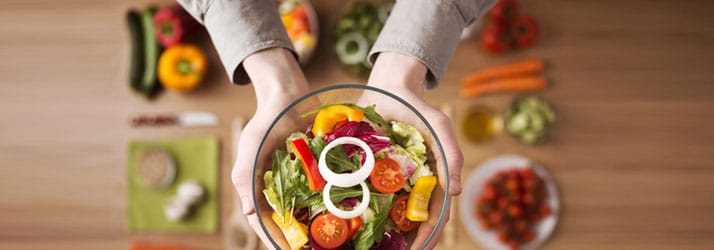6 Reasons to Eat a Plant-Based Diet (and Less Meat)
6 Reasons to Eat a Plant-Based Diet (and Less Meat)

Written by Dr. Elliot Lysyk, DC ~ Vernon Chiropractor
As a Chiropractor in Vernon, it’s natural for me to talk a lot about health and lifestyle with my patients. Nutrition and food are always hot topics.
Now, before you read on, keep in mind that I was raised in Alberta on a farm. Yet over the years, I have chosen to drastically reduce the amount of meat I consume. While I still occasionally eat meat, for the most part, I stick to and recommend a plant-based, whole-food diet.
It's both the easiest and the hardest diet to follow. It’s easy because it makes food choices simple. “Plant-based” means anything that’s not an animal product, so that’s easy enough. “Whole food” means it can’t be processed or manufactured by humans. The difficulty lies in how much we have come to love sizzling flesh and refined foods. Even I occasionally suffer whiplash as my head snaps back from the smell of a good barbecue!
Still, I advise patients to explore a plant-based whole-food diet as much as possible, especially if they’re experiencing ongoing joint and muscle pain, gastrointestinal issues, skin disorders, or more sinister diseases like cancer. It’s no surprise that patients who are suffering the most are also the most likely to make radical changes to their eating habits. But instead of waiting for that diagnosis, why not explore eating for health and fuel rather than just for taste? Most of us inherently know that plant-based nutrition is probably better for us anyway, right? Here are 6 reasons why:
- As Chiropractors, we teach people how to feel more optimal. Since adopting this diet, I myself feel lighter and more vital. I have more energy and am less sore after a long day. I now feel as though I have a metabolic advantage to make my dreams, and the energy they demand, achievable.
- Then there’s the reduced environmental impact that vegetarians have over meat-eaters. By conservative estimates, vegetarians will require about one acre of land for every 2-3 acres their non-veggie neighbors will need to grow their food. Cattle need to eat a lot of grass and grain in order to produce a small portion of calories found in their flesh. Ingesting your calories directly from plant foods means you are drastically cutting back on land, fuel and other energy resources needed to sustain you.
- Water is another big one. To create a quarter-pound burger, about 600 gallons or 2,400 liters of water is required to hydrate the cow, grow its food and process its carcass! I was floored by that. That’s two four-seater hot tubs of water for a scrap of meat between bread! The water footprint for meat production is enormously larger than vegetable growing. And with a planet that is beginning to feel the effects of water shortages, we can play an enormously positive part with our eating choices.
- Ok, back to our health again. Since animals and fish must ingest and process large quantities of plants or algae in order to grow to market weight, the toxicities normally found in small amounts in plants end up condensing in the tissues of the animal or fish, magnifying the toxicity when we consume their flesh. You’ve likely heard of the heavy metal toxicities found in fish and shellfish, which is why pregnant women are told not to eat them. And if pregnant women are told to avoid it, it’s probably best that we all avoid it, since we are all made up of human tissue, no?
- I was encouraged to read “The China Study,” by T. Colin Campbell, one of the most comprehensive nutritional studies. This study makes some clear points about the relationship between animal-based diets and the increased risks for cancer, heart and vascular diseases, autoimmune diseases, and more. I challenge you to read or listen to it and decide for yourself.
- And who can end a conversation like this without addressing animal rearing and treatment? I grew up on a small mixed farm. It was pretty much as ideal as animals can be raised—no steroids, no antibiotics (unless the animal had a bad infection), and lots of open pasture and grass. But most of the animal products consumed today are not raised in this way. The mouth of the world has gotten so big, and the demand for meat and fish is now so enormous that the treatment of animals has become shocking. Indeed, properly sourcing our meat is becoming a more common practice, and for that I am grateful. Still, it’s arguable that consuming large amounts of meat is not sustainable for the number of mouths we are now feeding. And the global population is set to grow to 9 billion by 2050!!
So, instead of waiting to make radical food changes when your situation is desperate, try reducing your meat intake and choosing less processed foods. For starters, maybe try having a meat-free day each week. And then try six more! That may be hard for some of you to swallow, but consider the benefits that many plant-based, whole-food eaters describe—increased energy and vitality, less pain and inflammation, drastically lowered risk for heart disease and cancer—and perhaps you, too, will be convinced.
OFFICE HOURS
Monday
7:00am - 7:00pm
Tuesday
7:00am - 7:00pm
Wednesday
7:00am - 7:00pm
Thursday
7:00am - 7:00pm
Friday
7:00am - 7:00pm
Saturday
8:00am - 1:00pm
Arise Chiropractic and Wellness
100 Kalamalka Lake Road #7
Vernon, BC V1T 9G1
Chiro / Massage:
(250) 275-7616
Fax:
(250) 275-7618

